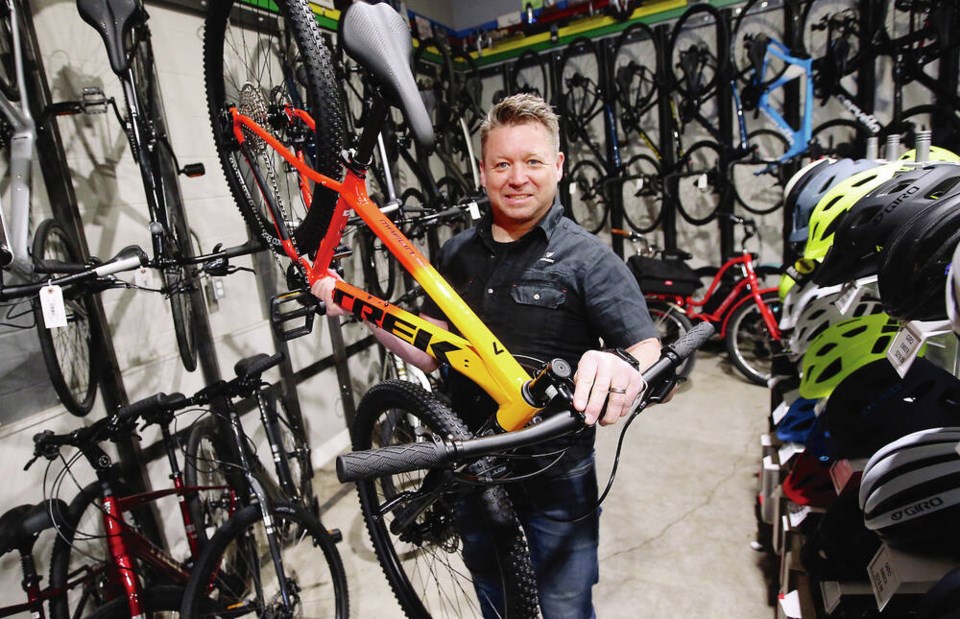After weathering a surge in demand sparked by the COVID-19 pandemic, a shortage caused by breakdowns in the supply chain and rising prices, local bike shops say they are in good shape as they gear up for the start of the cycling season.
“Demand is still crazy. It was crazy through the pandemic but we learned from that,” said Bill Fry, owner of Trek Bicycle Store Victoria.
“The bicycle industry was already going flat out before the pandemic. Once it hit and gyms closed, bicycle demand just went through the roof.
“At the same time, COVID-19 hit other parts of the world, closing factories and creating backlogs, for which we are still playing catch-up.”
The bike boom in 2020 taught Fry to carry more stock over the winter just to be able to have it on hand in the spring.
“If we sold three of one model in a year, I would then order 10 in expectation of demand, so that I would have some inventory,” he said.
If a customer is flexible on colour, they should be able to get a bicycle almost immediately, or soon after ordering. If they have special requirements, an extra-large frame in a particular colour for example, they may have to wait until next year to take delivery. Some models show availability in 2025, Fry said.
At Russ Hay’s The Bicycle Shop, the situation is similar. The addition of electric bicycles has helped soften supply problems.
“We have stopped giving people an estimated time of arrival,” said Ryan Simpson, who works in sales.
“If you ordered your bicycle mid- to late 2021, I don’t know where your bike is. It could be here in two weeks or maybe in August — I just don’t know anymore.”
But Simpson said that his in-stock situation is relatively good. An average-sized person can still walk in the store and ride home on a new hybrid bike — the most popular type he sells — as long as they are not picky when it comes to the model and colour.
Electric bicycles make up a third of new bicycle sales at the store; they generally cost from $2,700 to $5,000, with specialty ones costing up to $15,000.
The main growth in e-bikes is from consumers buying them as a means to escape rising gas prices. While more expensive than a regular bicycle, today’s e-bikes represent good value, Simpson said.
“The $3,000 e-bike you buy today is a better bike than the $3,000 e-bike from five years ago,” he said.
While there are still supply-chain issues — a few months back there was a shortage of tires that held up production — the factories that manufacture e-bikes aren’t the same as the one assembling conventional bicycles, so when one is affected, the other may not experience any delays.
Either type of bicycle can be delayed at ports due to a shortage of shipping containers.
With the opening of gyms, the bicycle market is becoming more balanced, as seen before the pandemic. The original boom in 2020 has had a positive impact on today’s supply-constrained market with some owners selling their lightly-used bicycles last year.
JK Bicycleitis on Bay Street sells both new and refurbished used bicycles. Used bikes have gone from making up 50 per cent to 70 per cent of its sales.
“Our most popular bicycle is a 90s mountain bike that we have ‘commuterized’,” said Jeremy Kumbruch, son of Hans Kumbruch, who started the store in 1990.
He takes a used bicycle and replaces worn parts with new ones, tunes it up and replaces the original knobby tires with commuter bike tires built for comfort. The refurbished bikes come with a three-month warranty and carry a $300 to $500 price tag.
“It’s a more affordable option that is popular with students,” said Kumbruch, who took over the store from his father in 2008.
He also has a selection of children’s bicycles, with wheel sizes of 12- to 24-inches. He estimates that a decent new bicycle starts at around $700. While Kumbruch acknowledges it may be hard for parents to spend that much on something their children will grow out of, the cheaper ones cannot be repaired and are “basically disposable”.
While he does not have any used e-bikes in his inventory at present, he benefits from an increase in used bikes after riders pick up their new electrified rides and trade-in their old rides.
• To comment on this article, write a letter to the editor: [email protected]



